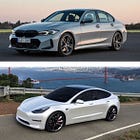The End of Petrol and Diesel Cars? Debating the Need for Combustion Vehicles
Explore the rise of EVs, the potential end of combustion cars, and the debate on their necessity. Uncover the future of UK transport.
The automotive landscape is undergoing a seismic shift. Electric vehicles (EVs) are no longer a niche market, but a growing force on the roads of the United Kingdom. The UK government has set an ambitious target to ban the sale of new petrol and diesel cars by 2030, accelerating the transition to zero-emission vehicles(1). This raises a critical question: Is there still a need for traditional combustion engine cars?
Environmental Benefits of Phasing Out Petrol and Diesel
The environmental case for EVs is compelling. Unlike petrol and diesel cars, EVs produce zero tailpipe emissions, significantly reducing overall greenhouse gas emissions. If the UK can achieve its goal of a fully electric fleet, it could see a reduction of 12% in total UK emissions(2).
Moreover, EVs can contribute to improving air quality, particularly in urban areas. Road transport is responsible for approximately 50% of NOx emissions, a significant contributor to air pollution. Transitioning to EVs could drastically reduce these emissions, improving public health(2).
The Rise of EV Technology
The availability and improvement of EV technology have been key drivers in their adoption. Battery technology has advanced significantly, with increasing energy densities and decreasing costs. The range of many new EVs now competes with or even exceeds that of many petrol or diesel cars(3).
The charging infrastructure is also expanding rapidly. There are now over 35,000 charge point connectors across the UK, a number that continues to grow(3).
Lower Operating Costs and Shifting Consumer Demand
From a financial perspective, EVs are becoming increasingly attractive. While the upfront cost can be higher, the lower operating costs can offset this over the vehicle's lifetime. EVs are cheaper to run, with lower fuel and maintenance costs(3).
Consumer demand is also shifting. In 2020, one in ten new cars sold in the UK was an electric or plug-in hybrid, up from just one in 30 the previous year(4).
Government Policies
The UK government has been proactive in promoting EVs. The proposed ban on new petrol and diesel sales by 2030 is among the most ambitious targets globally. The government has also introduced a range of incentives, including grants for new EVs and charging points, to encourage adoption(1).
Counterpoint: The Current Limitations of EVs
Despite the many advantages of EVs, there are still challenges to overcome. 'Range anxiety' remains a concern for potential buyers, although this is decreasing as battery technology improves. While falling, the upfront cost of EVs is still higher than comparable petrol or diesel cars(5).
Access to charging can also be a barrier, particularly for those without off-street parking. While the public charging network is growing, more needs to be done to ensure it can meet future demand(5).
Hybrids can play a role in the transition to fully electric vehicles. They offer some of the benefits of EVs, such as lower emissions and improved fuel efficiency, without the need for charging infrastructure. However, they still rely on petrol or diesel for part of their power, and so do not fully solve the emissions problem.
Conclusion
The debate over the end of petrol and diesel cars is complex. The environmental, technological, and economic arguments for EVs are strong, and consumer demand and government policy are shifting in their favour. However, challenges remain, and a complete transition will take time and significant investment in infrastructure.
The future of petrol and diesel cars is uncertain. What is clear is that the automotive industry is changing, and electric vehicles will play a major role in this new era. As policymakers navigate this transition, they will need to balance the benefits of EVs with the current limitations and ensure that the shift to electric is inclusive and equitable for all.







